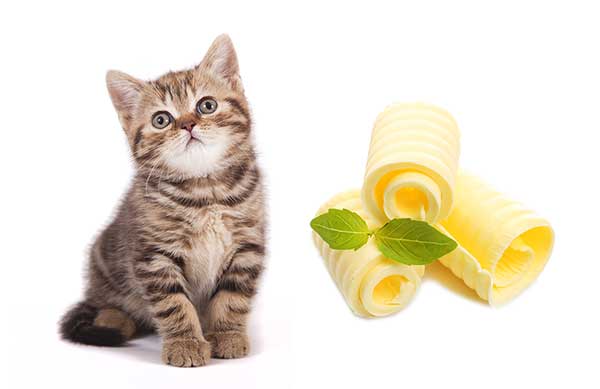Butter is a yummy, flavorful, and highly nutritious treat for humans. However, according to expert nutritionists, butter should only be used in moderation.
Interestingly, most foods that are considered harmful for us carry an even greater danger to our feline friends.
If your cat has a penchant for licking butter behind your back, you should move with speed to arrest the habit before the cat develops some serious health issues.
So, you’re probably now wondering, can cats eat butter?
The simple answer is NO, cats cannot eat butter. The immediate risks of butter for cats lie in the fact that most cats are lactose intolerant. Therefore, their stomachs aren’t designed to process butter so well. In addition to lactose intolerance, butter carries numerous other health risks for your kitto.
Maybe you’re a loving cat owner who’s always wondering, “my cat is a butter fiend; is that a bad thing?”
As we’ve just pointed out, butter isn’t safe for your cat and the sooner you get the cat to stop eating butter, the better for the animal.
Read on as we expound further on the possible things that could go wrong if your cat ate butter. We will also examine if there is any way your kitto can benefit from butter, both nutritionally and health-wise.
Table of Contents
Is It Safe for Cats to Eat Butter? More about Butter
Should cats eat butter?
This is a controversial question, not only for cats but also for humans. Before we delve deeper into the potential health risks and benefits of butter for cats, let’s begin easy by understanding what butter really is.
Butter is a dairy product that’s made by churning milk. The churning process separates solid fats from a liquid known as buttermilk.
Butter is mostly obtained from cow’s milk. However, you can also come across butter that’s derived from sheep, goats, camel, and even buffalo milk.
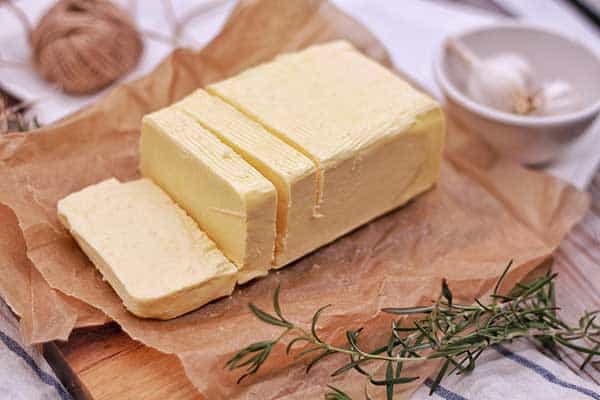
Butter contains numerous nutrients, including calories, fat, and Vitamins (A, B12, E, and K). It’s one of the most common breakfast ingredients in homes all over the world.
Butter may also be used in the preparation of certain foods, as well as in many desserts, making it one of the most versatile foods out there.
However, butter is characterized by its high-fat content, which makes it a less-than-ideal food.
Well, fat is not entirely bad. In fact, fat is an essential component of a balanced diet, as it happens to be the main energy substrate in our bodies. But when it comes to adding fat to our diets, the unwritten rule is to always experiment with less. And if the fat in question is considered “bad fat,” then you want to avoid it altogether.
Now, the question remains – can cats have butter? The following sections shall help to expound further on that.
What Happens If A Cat Eats Butter?
Is it okay for cats to eat butter?
It’s not okay to offer butter to your feline friend, as the cat might develop various health issues.
The following are some of the health concerns associated with butter for cats;
1. Fat-related Problems
The high fat content in butter is undeniably the main reason why professional vets discourage butter for cats.
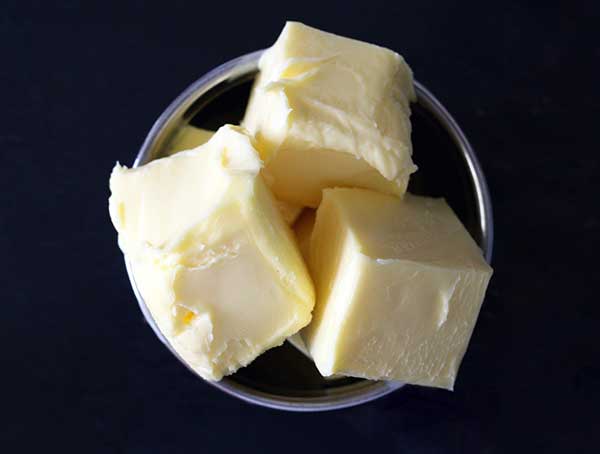
Every tablespoon of butter (roughly 14 grams) comes with up to 11.5 grams of fat. That’s significantly higher than the amount of fat you get in most fatty foods out there.
Allowing your cat to snack on such a fatty food is exposing your feline friend to the risks of obesity.
Obesity makes it difficult for your cat to engage in productive playtime, which adversely affects its social life.
Obesity also makes it difficult for the cat to hunt down rodents in your house or backyard. The health and economic implications of rodents are well-documented. So, the last thing you want is for these pesky animals to turn your home into a breeding ground.
In addition to obesity, other medical conditions that your cat might get from eating too much butter include heart disease, diabetes, and pancreatitis. Pancreatitis refers to the inflammation of the pancreas. The pancreas is an organ in mammals that secretes digestive juices.
When your cat’s pancreas can no longer function as efficiently as it should, it secretes digestive juices but doesn’t release those juices into the cat’s digestive tract. Instead, the juices turn on the organ and digest its tissues, resulting in inflammation.
Symptoms of pancreatitis include;
-
- Vomiting,
- Diarrhea,
- Loss of appetite,
- Dehydration,
- Weight loss, and
- Abdominal pain
Even if your cat is lucky enough not to develop any of the above fat-related conditions after eating butter, gastrointestinal stress is almost always expected. So, can cats get sick from eating butter? They sure can.
2. Lactose Intolerance
This is another reason why cats shouldn’t eat butter. As we already mentioned, butter is a dairy product, and that means it comes with a fair share of lactose. Lactose is a sugar that’s found in most dairy products; the same that cats cannot digest.
The reason cats cannot process lactose is that they lack the enzyme required to digest this sugar, known as lactase.
When a cat is born, its body is usually able to produce lactase. That’s why kittens can drink milk and eat other dairy products without experiencing gastrointestinal complications. However, immediately after the cat is weaned, its body gradually stops producing the enzyme.
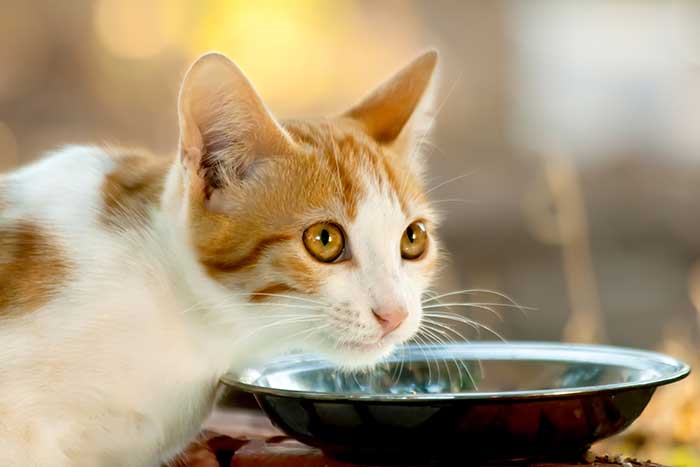
3. Poor Nutritional Profile
Butter may boast a rich nutritional profile for humans. However, the same cannot be said about cats.
As you may already know, cats are obligate carnivores. As such, they derive all their nutrients from a diet of animal protein. That’s not to mean that they cannot nibble on dairy products or plant-based foods occasionally.
However, if offered a chance between feeding your feline friend a treat made of butter or lean meat, you’re better off settling for the latter.
As an obligate carnivore, your cat’s nutritional requirements should feature more animal protein and less fats and carbs.
Unfortunately, butter contains more fats and less protein. Worse yet, the fat in butter exists in its pure form, which makes it even less beneficial for your furry, little friend.
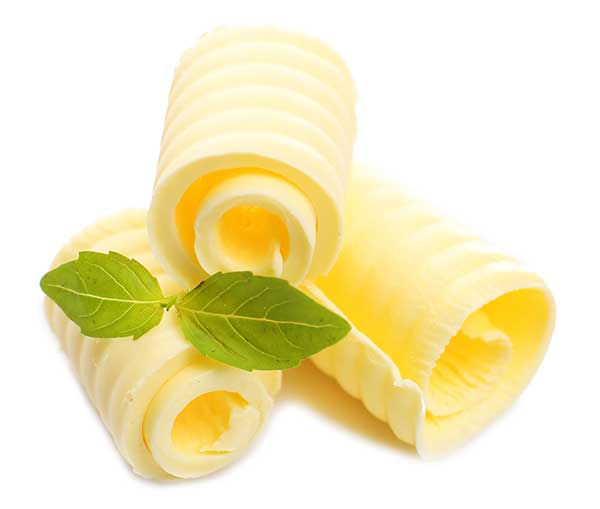
Still on butter’s less-than-ideal nutritional profile, it’s worth noting that the food lacks in fiber.
Fiber is one of the top reasons vets encourage feeding cats foods that are not animal protein. So, if you’re scouting the market for a fiber-rich food to supplement your cat’s regular diet, butter shouldn’t be one of them.
In addition to the above reasons, butter also comes with risks of allergy. That’s because your cat’s digestive system mostly considers butter a foreign substance.
Symptoms of an allergic reaction to butter range from GI complications to skin irritation, bowel and bladder irregularities, and irritable behavior. So, can butter hurt cats?
Based on the risks we’ve highlighted here, butter can, indeed, hurt cats.
- Number 1 veterinarian-recommended cat probiotic brand to support digestive health (Kantar Veterinary Tracker, 2021), making it an...
- Purina Pro Plan Sensitive stomach cat food supplement for the dietary management of kittens and adult cats with cat diarrhea
- Digestive Care Cat Food supplement containing probiotics proven to promote intestinal health and balance
Last update on 2024-07-12 / Affiliate links / Images from Amazon Product Advertising API
Is There Any Way Around Butter for Cats?
Having reviewed the numerous potential risks of butter for cats, you may be wondering if there’s a safe way you can feed the food to your feline friend.
Fortunately, there is. While experts generally discourage butter for cats, the health risks aren’t as severe compared to the risks of other condiments like salt, onions, or garlic.
However, if you’re serious about feeding butter to your cat, you must proceed with caution. First, ensure you introduce your cat to butter carefully, monitoring the animal for any adverse effects.
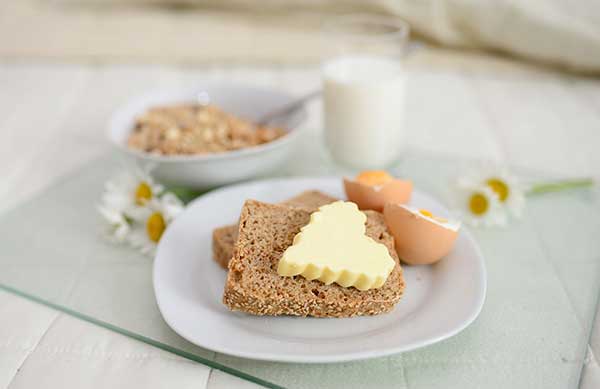
If you notice any symptoms, withdraw the food from your cat’s diet immediately. If the symptoms persist, consult your vet.
Even if the cat ends up developing a love affair for butter, always keep the portions low. Remember that you should only feed butter to your cat as an occasional treat.
As a snack, butter can benefit your cat in the following ways;
✔ Contains butyrate, which nourishes your cat’s gut-friendly bacteria,
✔ Helps cats get rid of hairballs,
✔ Contains conjugated linoleic acid that’s useful in weight management and fighting cancer cells, and
✔ Contains other antioxidants that are useful in preventing the onset of various diseases.
Another great news for butter is that while it contains lactose, the quantity is significantly lower compared to other dairy products.
Therefore, unless your cat is allergic to butter, it’s unlikely to develop lactose intolerance symptoms. All in all, whether using butter for cat’s hairballs or for other reasons, always experiment with low doses.
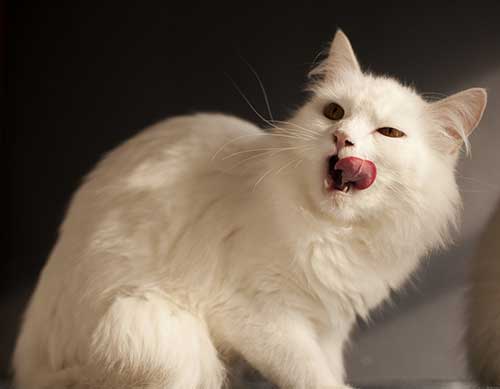
Other Frequently-Asked Questions About Cats and Butter
Can cats eat garlic butter?
Garlic isn’t healthy for cats, so garlic butter is bad for cats.
Can cats eat bread and butter?
As both bread and butter are high in carbs, they are not ideal for cats.
Can cats eat raw butter?
No. Besides the high fat content, raw butter also presents the risks of bacterial infections.
Can cats eat cashew butter?
Cashews contain too much fat which could be detrimental to your cat’s health. If you must feed cashew butter to your kitto, keep the portions low.
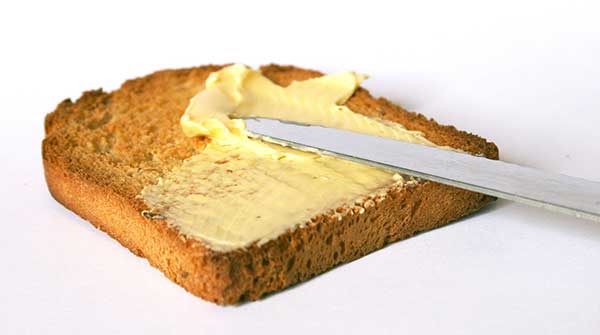
Can cats eat vegan butter?
Most cat owners often wonder, can you give vegan butter to a cat?
Vegan butter is a healthy butter alternative for humans. But since cats are carnivores, they won’t benefit from the ingredients in vegan butter.
Can cats eat Shea butter?
A little bit of Shea butter is great for cats. It helps to control dry skin, dander and hot spots.
Is coconut butter healthy for cats?
Coconut butter also supports your cat’s coat and skin. But just like Shea butter, only apply it in moderation.
Can cats eat sunflower seed butter?
Yes. Sunflower seed butter is packed with several nutrients that your cat can benefit from, including vitamin E and selenium.
Can cats eat cocoa butter?
Contrary to popular belief, cocoa is actually safe for cats. That makes cocoa butter okay for your feline friend. Of course, you want to keep the portions low.
- Ultra-quiet & low consumption pump – The Veken pump is ultra-quiet (measured below 40dB) and low consumption which means that it...
- 2.5L large capacity – It has a water capacity of 2.5 liters (84 ounces), which means that it is great for small to medium sized...
- BPA free & quality material – Made of quality PP resin, this automatic water bowl is BPA free, durable, and it’s easy to...
Last update on 2024-07-12 / Affiliate links / Images from Amazon Product Advertising API
Can cats eat almond butter?
No. Almonds are toxic to cats, so almond butter cannot be safe for them either.
Can cats eat apple butter?
Apples contain the toxic compound cyanide. So, you’re better off not feeding apple butter to your kitto.
Can kittens eat butter?
Kittens can eat butter in moderation, since they contain the enzyme lactase that can process lacrosse.
Can cats eat too much butter?
Absolutely not. When it comes to butter for cats, moderation is key.
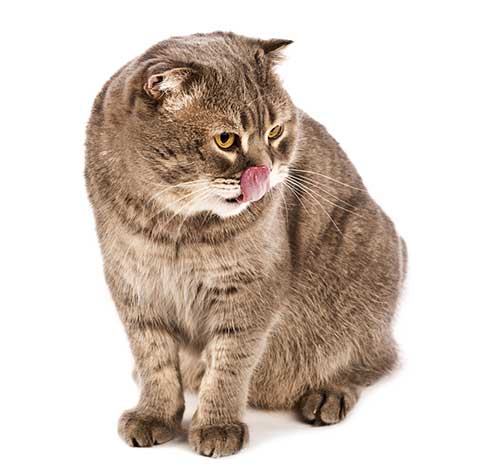
So, It Is Ok To Give My Cat Butter?
Having reviewed all the potential benefits and side effects of butter for cats, you may still be wondering, is butter bad for cats?
Well, if you can, avoid introducing your feline friend to butter in the first place. But if the cat has developed a strong liking for butter, you can go ahead and feed it in moderation.

